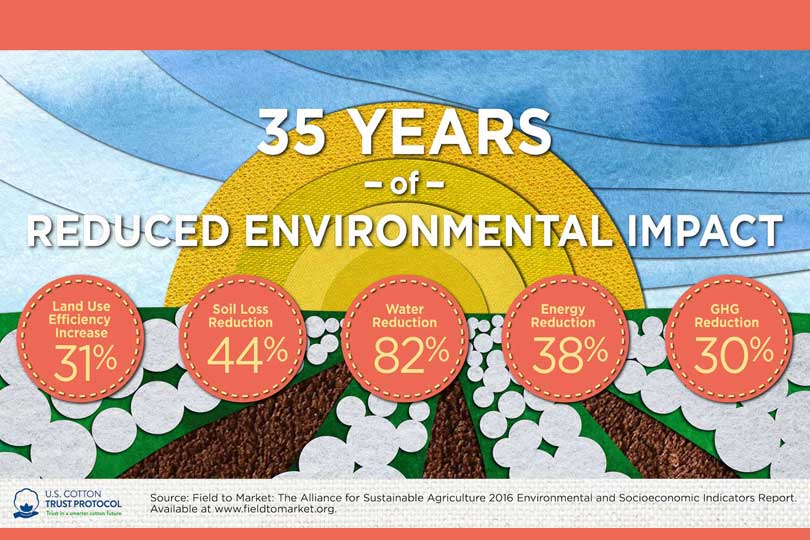By Jennifer Dorsett
Field Editor
After a year-long pilot phase, the U.S. Cotton Trust Protocol is now ready to take on new members, including brands and retailers.
The Trust Protocol, which was introduced in 2018, is an integrated data collection, measurement and verification procedure documenting U.S. cotton production practices and the environmental impact.
Six areas of sustainability in line with U.N. Sustainability Goals are tracked annually, allowing brands and retailers to demonstrate year-over-year progress toward meeting sustainability commitments.
“One of our goals in developing the Trust Protocol is to give brands and retailers greater confidence when including U.S. cotton in their sourcing mix,” U.S. Cotton Trust Protocol Executive Director Ken Burton said. “Participating brands and retailers will now be able to demonstrate measurable progress in reducing their environmental footprint and in achieving sustainability targets.”
By working with Field to Market: The Alliance for Sustainable Agriculture and Control Union Certifications North America, the Trust Protocol enables brands and retailers to better track cotton entering their supply chains. The data provides the global textile supply chain and its consumers additional assurances that U.S. cotton is being produced in a responsible manner.
Member brands like Levi Strauss & Co. will have access to aggregate annual data on water use, greenhouse gas emissions, energy use, soil carbon and land use efficiency.
“At Levi Strauss & Co., the quality and sustainability of the cotton we use is critical to our business and important to our customers. We are deeply committed to sourcing sustainable cotton and reducing water usage, carbon emissions and chemical usage,” Liza Schillo, senior manager of Global Sustainability Integration at Levi Strauss and Trust Protocol board member, said. “We are, therefore, in strong support of the introduction of standards–including the U.S. Cotton Trust Protocol–that champion sustainably-grown cotton and drive wider adoption over the long-term of sustainable cultivation practices.”
In June, the Trust Protocol was added to Textile Exchange’s list of 36 preferred fibers and materials from which more than 170 participating brands and retailers can select as part of Textile Exchange’s Material Change Index program.
Over the past 35 years, U.S. cotton has made significant improvements in sustainability, including increasing land use efficiency and reducing soil erosion, water and energy usage and substantially reducing greenhouse gas emissions, according to the Trust Protocol.
To continue these efforts, the organization has set specific goals for 2025 which include enrolling more than half of all U.S. cotton farmers in the program.
The organization is overseen by a board of directors comprised of representatives from brands and retailers, civil society and independent sustainability experts, as well as the cotton-growing industry including growers, ginners, merchants, wholesalers and cooperatives, mills and cottonseed handlers.
Click here for more information on joining the Trust Protocol.

